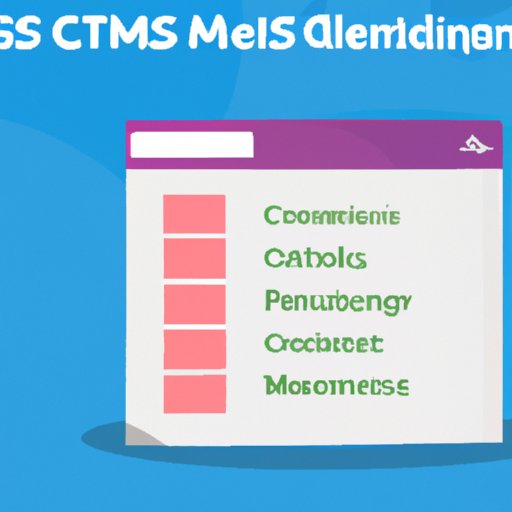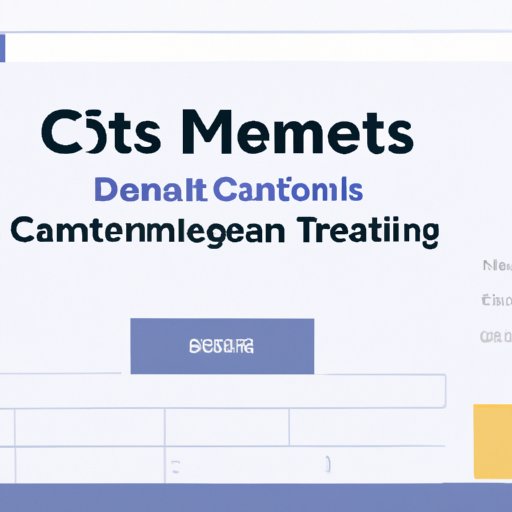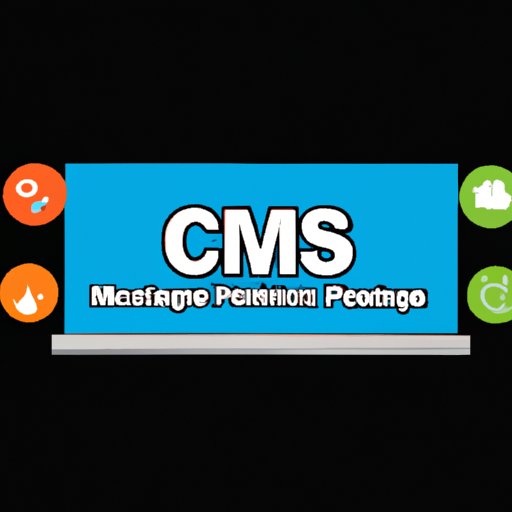Introduction
Content management systems (CMS) are a type of software that help businesses manage their websites and web content easily and efficiently. With a CMS, businesses can create and manage digital content across multiple channels in an organized and streamlined way. In this article, we’ll explore what CMS technology is, how it works, and how to choose the right CMS technology for your website.
Exploring CMS Technology: What It Is, How It Works
At its core, CMS technology is used to simplify the process of creating, editing, and managing digital content. By using a CMS, businesses are able to quickly and easily update their websites without requiring extensive coding knowledge. The goal of CMS technology is to make it easier for businesses to keep their content up-to-date and consistent across multiple channels.
A CMS typically consists of two main components: a content management application (CMA) and a content delivery application (CDA). The CMA is used to create and manage digital content, while the CDA is used to deliver the content to users. Together, these two components make it possible for businesses to manage their digital content in an efficient and effective way.
There are several different types of CMS technologies available, including open source, proprietary, and hosted solutions. Open source CMS technologies are free, but require a certain level of technical expertise to use. Proprietary CMS technologies are typically sold as software packages and require a license fee. Hosted solutions are managed by third-party vendors who provide support and maintenance services.

A Comprehensive Guide to Understanding CMS Technology
To get the most out of CMS technology, it’s important to understand the features and functionalities of each type of system. For example, some CMS systems offer simple drag-and-drop interfaces, while others require more advanced coding knowledge. Additionally, some CMS systems focus on delivering content quickly, while others prioritize features such as search engine optimization (SEO) or social media integration.
When choosing a CMS, it’s important to consider your specific needs and requirements. Different CMS platforms have different strengths and weaknesses, so it’s important to evaluate which platform best meets your needs. Additionally, it’s important to consider the cost of each solution and determine the long-term benefits of investing in one system over another.

Designing with CMS Technology: Tips and Strategies for Developers
Developers should also be aware of best practices for developing with CMS technology. This includes making sure the code is clean and organized, as well as ensuring that the user experience is optimized for the target audience. Additionally, developers should consider how the CMS will integrate with existing systems, such as databases and APIs.
When designing with CMS technology, it’s important to think ahead and plan for future updates and changes. This includes considering the potential scalability of the system and whether the current design will accommodate future growth. Additionally, developers should consider how they will maintain the system over time and how they will handle any security issues that may arise.
The Pros and Cons of Using CMS Technology in Your Business
As with any technology, there are both advantages and disadvantages to using CMS technology in your business. One of the primary advantages is that it makes it easier to create and manage digital content in an efficient and organized way. Additionally, CMS technology can help businesses save time and money by streamlining processes and eliminating the need for manual coding.
On the other hand, there are also some challenges associated with using CMS technology. For example, many CMS systems require a certain level of technical expertise to use, which can be difficult for businesses without an IT department. Additionally, there are often additional costs associated with using a CMS, such as licensing fees and maintenance costs.

How to Choose the Right CMS Technology for Your Website
When selecting a CMS technology for your website, it’s important to evaluate the various options available. This includes researching the features and functionalities of each platform, as well as comparing the costs and benefits of different solutions. Additionally, it’s important to consider how the CMS will integrate with existing systems and whether it will meet the needs of your organization.
Once you’ve narrowed down your choices, it’s important to test the CMS technology to ensure that it meets your expectations. This includes testing the user interface and functionality, as well as evaluating the performance of the system. Additionally, it’s important to consider the long-term implications of using a particular CMS technology and determine whether it will be able to accommodate future growth.
Leveraging CMS Technology to Create Engaging Content Experiences
In addition to making it easier to create and manage digital content, CMS technology can also be used to generate more engagement with your website visitors. This includes optimizing content delivery with features such as caching and image compression, as well as utilizing tools such as social media integration and search engine optimization (SEO). Additionally, CMS technology can be used to create personalized content experiences based on user preferences and behaviors.
Conclusion
CMS technology is an invaluable tool for businesses looking to create and manage digital content in an efficient and organized way. With a CMS, businesses are able to quickly and easily update their websites without requiring extensive coding knowledge. Additionally, CMS technology can be used to create engaging content experiences that drive more engagement and conversions.
When selecting a CMS technology for your website, it’s important to evaluate the various options available. This includes researching the features and functionalities of each platform, as well as comparing the costs and benefits of different solutions. Additionally, it’s important to consider how the CMS will integrate with existing systems and whether it will meet the needs of your organization.
Overall, CMS technology is an incredibly powerful tool for businesses looking to create and manage digital content efficiently and effectively. By leveraging the power of a CMS, businesses can create engaging content experiences that drive more engagement and conversions.
(Note: Is this article not meeting your expectations? Do you have knowledge or insights to share? Unlock new opportunities and expand your reach by joining our authors team. Click Registration to join us and share your expertise with our readers.)
